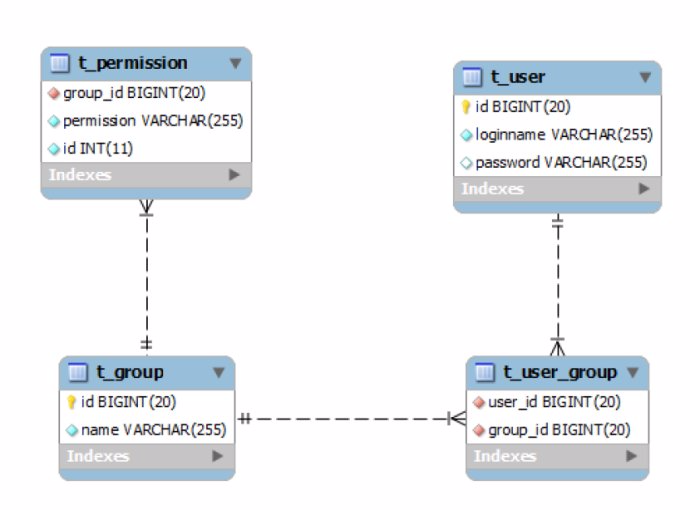Shiro权限框架简单快速入门
首先配置我们的web.xml代码如下:
<filter><filter-name>shiroFilter</filter-name><filter-class>org.springframework.web.filter.DelegatingFilterProxy</filter-class></filter><filter-mapping><filter-name>shiroFilter</filter-name><url-pattern>/*</url-pattern></filter-mapping>
@Override
protected AuthorizationInfo doGetAuthorizationInfo(PrincipalCollection principalCollection) {
//获取当前登陆的用户名
String loginName =
(String) principalCollection.fromRealm(getName()).iterator().next();
//根据用户名查找对象
User user = userService.findByLoginName(loginName);
if(user != null) {
SimpleAuthorizationInfo info = new SimpleAuthorizationInfo();
//添加角色(Set集合<字符串>)
info.setRoles(user.getGroupNameSet());
//迭代用户对应的角色集合,为了获取角色对应的权限
for(UserGroup g : user.getUserGroupList()) {
//添加permission
info.addStringPermissions(g.getPermissionStringList());
}
return info;
}
return null;
}
@Override
protected AuthenticationInfo doGetAuthenticationInfo(
AuthenticationToken authenticationToken) throws AuthenticationException {
UsernamePasswordToken token = (UsernamePasswordToken) authenticationToken;
//根据用户名去查找对象
User user = userService.findByLoginName(token.getUsername());
if(user != null) {
return new SimpleAuthenticationInfo(user.getName(),
user.getPassword(),getName());
}
return null;
}
public void setUserService(UserService userService) {
this.userService = userService;
}
}
各部分代码功能上面注释已基本解释了,我要说的是,我们平时有可能比较喜欢使用currUser对象,但是貌似在这里没有办法得到了。其实不然,首先shiro给我们提供的Subject的会话可以满足我们的需求
Session session = subject.getSession();
Session session = subject.getSession(boolean create);
这些方法在概念上等同于HttpServletRequest API。第一个方法会返回Subject的现有会话,或者如果还没有会话,它会创建一个新的并将之返回。
第二个方法接受一个布尔参数,这个参数用于判定会话不存在时是否创建新会话。一旦获得Shiro的会话,你几乎可以像使用HttpSession一样使用它。Shiro团队觉得对于Java开发者,HttpSession API用起来太舒服了,所以我们保留了它的很多感觉。当然,最大的不同在于,你可以在任何应用中使用Shiro会话,不仅限于Web应用。因此你可以再验证登陆里写这样的一句话来完成我们的代码转换SecurityUtils.getSubject().getSession().setAttribute("currUser", user);注意在异常处理里需要移除此currUser。当然官方推荐使用Subject currentUser = SecurityUtils.getSubject()。
最后就是我们的Controller了。在这里我介绍登陆和退出
@RequestMapping("/user/login")
public String login(User user,HttpSession session) {
try {
SecurityUtils.getSubject().login(new UsernamePasswordToken(user.getName(), user.getPassword()));
return "redirect:/index";
} catch (AuthenticationException e) {
session.setAttribute("msg","用户密码错误或用户名不存在");
return "redirect:/user/tologin";
}
}
@RequestMapping("/user/exit")
public String exit() {
SecurityUtils.getSubject().logout();
return "redirect:/user/login";
}
好了,这样基本算是完成任务了,接下来就是页面上的操作了。为此shiro还提供了相应的标签,在这里我就照搬官方的了,因为这个实在简单,大家一看就明白
引用<%@ taglib prefix="shiro" uri="http://shiro.apache.org/tags" %>
guest标签
验证当前用户是否为“访客”,即未认证(包含未记住)的用户
- <shiro:guest>
- Hi there! Please <a href="login.jsp">Login</a> or <a href="signup.jsp">Signup</a> today!
- </shiro:guest>
user标签
认证通过或已记住的用户
- <shiro:user>
- Welcome back John! Not John? Click <a href="login.jsp">here<a> to login.
- </shiro:user>
authenticated标签
已认证通过的用户。不包含已记住的用户,这是与user标签的区别所在。
- <shiro:authenticated>
- <a href="updateAccount.jsp">Update your contact information</a>.
- </shiro:authenticated>
notAuthenticated标签
未认证通过用户,与authenticated标签相对应。与guest标签的区别是,该标签包含已记住用户。
- <shiro:notAuthenticated>
- Please <a href="login.jsp">login</a> in order to update your credit card information.
- </shiro:notAuthenticated>
principal 标签
输出当前用户信息,通常为登录帐号信息
- Hello, <shiro:principal/>, how are you today?
hasRole标签
验证当前用户是否属于该角色
- <shiro:hasRole name="administrator">
- <a href="admin.jsp">Administer the system</a>
- </shiro:hasRole>
lacksRole标签
与hasRole标签逻辑相反,当用户不属于该角色时验证通过
- <shiro:lacksRole name="administrator">
- Sorry, you are not allowed to administer the system.
- </shiro:lacksRole>
hasAnyRole标签
验证当前用户是否属于以下任意一个角色。
- <shiro:hasAnyRoles name="developer, project manager, administrator">
- You are either a developer, project manager, or administrator.
- </shiro:lacksRole>
hasPermission标签
验证当前用户是否拥有制定权限
- <shiro:hasPermission name="user:create">
- <a href="createUser.jsp">Create a new User</a>
- </shiro:hasPermission>
lacksPermission标签
与hasPermission标签逻辑相反,当前用户没有制定权限时,验证通过
- <shiro:hasPermission name="user:create">
- <a href="createUser.jsp">Create a new User</a>
- </shiro:hasPermission>
还有一个重要的就是数据库的设计,我把图贴出来大家一看也就明白了,我在这里简单的描述下吧
user == subject:用户,group(role):角色
permission:权限(拥有权限比较细的情况,一般只要user和group就满足要求了)
最后 提一下jar包,别弄错了。是shiro-all.jar。可以从官网下载http://shiro.apache.org/download.html
Shiro权限框架简单快速入门的更多相关文章
- Shiro安全框架【快速入门】就这一篇!
Shiro 简介 照例又去官网扒了扒介绍: Apache Shiro™ is a powerful and easy-to-use Java security framework that perfo ...
- Shiro安全框架「快速入门」就这一篇
Shiro 简介 照例又去官网扒了扒介绍: Apache Shiro is a powerful and easy-to-use Java security framework that perfor ...
- php-laravel4.0框架 简单快速入门
前提必须已经安装好了laravel4.0版本. 写入权限: 安装完 Laravel ,你还需要为web服务器设置 app/storage 目录的写入权限. 目录结构: 安装完框架后,你需要熟悉一下该项 ...
- Shiro权限框架简介
http://blog.csdn.net/xiaoxian8023/article/details/17892041 Shiro权限框架简介 2014-01-05 23:51 3111人阅读 评论 ...
- Nodejs ORM框架Sequelize快速入门
Nodejs ORM框架Sequelize快速入门 什么是ORM? 简单的讲就是对SQL查询语句的封装,让我们可以用OOP的方式操作数据库,优雅的生成安全.可维护的SQL代码.直观上,是一种Model ...
- 在前后端分离的SpringBoot项目中集成Shiro权限框架
参考[1].在前后端分离的SpringBoot项目中集成Shiro权限框架 参考[2]. Springboot + Vue + shiro 实现前后端分离.权限控制 以及跨域的问题也有涉及
- (转) shiro权限框架详解06-shiro与web项目整合(上)
http://blog.csdn.net/facekbook/article/details/54947730 shiro和web项目整合,实现类似真实项目的应用 本文中使用的项目架构是springM ...
- Spring Boot:整合Shiro权限框架
综合概述 Shiro是Apache旗下的一个开源项目,它是一个非常易用的安全框架,提供了包括认证.授权.加密.会话管理等功能,与Spring Security一样属基于权限的安全框架,但是与Sprin ...
- SpringBoot整合Shiro权限框架实战
什么是ACL和RBAC ACL Access Control list:访问控制列表 优点:简单易用,开发便捷 缺点:用户和权限直接挂钩,导致在授予时的复杂性,比较分散,不便于管理 例子:常见的文件系 ...
随机推荐
- C#的New关键字的几种用法
一.在C#中,new这个关键字使用频率非常高,主要有3个功能: a) 作为运算符用来创建一个对象和调用构造函数. b) 作为修饰符. c) 用于在泛型声明中约束可能用作类型参 ...
- 数据结构《20》----Immutable stack
有趣的函数式数据结构<一>----不可变栈 什么是不可变?往栈中插入一个元素,原来的栈保持不变,返回一个新的栈(已插入新的元素). push, pop,getMax 等操作都要求在 常数时 ...
- 直接请求json文件爬取天眼查企业信息(未解决验证码问题)——python3实现
几个月前...省略一堆剧情...直接请求json文件爬取企业信息未成功,在知乎提问后,得到解决,有大佬说带上全部headers和cookie是可以的,我就又去试了下,果然可以(之前自己试的时候不行,没 ...
- BackTrack5-r3配置网络信息
设置静态IP在BT终端输入:ifconfig -a 按回车// 查看所有网卡在BT终端输入:vi /etc/network/interfaces ...
- OD调试17
程序先出现一个nag 然后出现主窗口 然后出现第二个nag窗口 我们查个壳 没有壳 那就载入OD看看,继续用调用堆栈的方法 发现一直执行用的都是这一个call,最后执行到程序结束.之 ...
- UICollectionview实现自定义cell的移动删除
今天 ,有群里人询问了 ,支付宝首页的UICollectionview 的cell(其实不能成为cell,应该是item,不过大家习惯这么称呼了)怎么实现 自定义的拖拽 和删除,然后我查了下资料,它的 ...
- java 集合:实现
集合本来就是为了方便开发的,实现了一些基本数据结构,一般来说数据结构有两种物理的实现:数组和链表.数组是连续的空间,链表是不连续的.基于这两种又扩展了很多的数据结构.队列,栈,hash表,树. 在ja ...
- [转]Linux 的多线程编程的高效开发经验
Linux 平台上的多线程程序开发相对应其他平台(比如 Windows)的多线程 API 有一些细微和隐晦的差别.不注意这些 Linux 上的一些开发陷阱,常常会导致程序问题不穷,死锁不断.本文中我们 ...
- with as的用法
;with T1 as ( select FTP_ID,FTP_NAME,FTP_Server,FTP_Port,FTP_UserID,FTP_Password from FTP_Config wit ...
- javascript中escape()、unescape()、encodeURI()、encodeURIComponent()、decodeURI()、decodeURIComponent()比较
这些URI方法encodeURI.encodeURIComponent().decodeURI().decodeURIComponent()代替了BOM的escape()和unescape()方法.U ...
